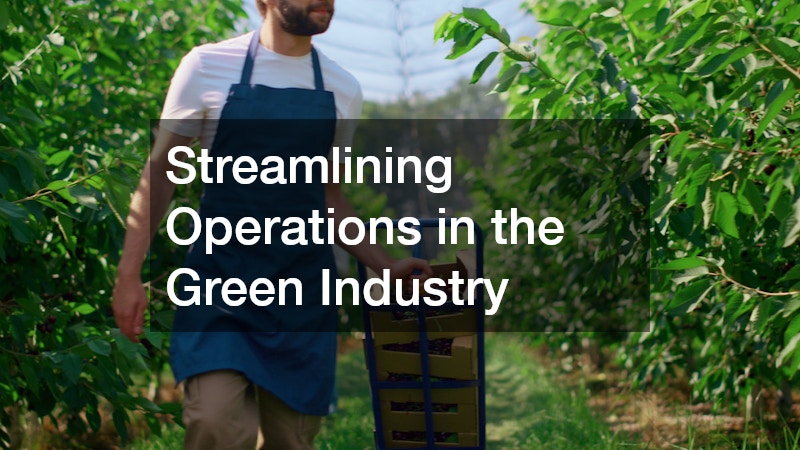In an increasingly competitive landscape, organizations across industries are seeking innovative solutions to optimize their operations. Efficiency can lead to significant competitive advantages, especially when processes are streamlined and workflows are refined. By leveraging technology and focusing on customer satisfaction, companies can unlock new levels of productivity, ultimately enhancing profitability and sustainability.
Streamlining operations not only improves effectiveness but also contributes to employee satisfaction and safety. Staff members are often required to navigate a myriad of tasks daily, and a focus on efficiency can reduce their stress by minimizing unnecessary work and allowing them to concentrate on their core responsibilities.
This article will explore various strategies and solutions that can enhance operational efficiency across different sectors. From logistical improvements to technological integration in traditional trades, we will examine best practices for streamlining workflows. Throughout this discussion, we will emphasize the concept of business and how it is crucial to organizations, helping them achieve greater success and improved customer satisfaction.

Streamlining Operations in the Green Industry
The tree business is one that can significantly benefit from streamlined operations. By adopting more efficient tree care technologies and scheduling methods, businesses can complete more jobs per day while increasing the quality of their services. In addition, using software tools for client management can reduce the time spent on administrative tasks, allowing teams to focus on what they do best: enhancing the greenery of their communities.
Moreover, sustainable practices in the tree business, like proper waste management and efficient use of resources, can contribute to maintaining profitability while minimizing environmental impact. This aligns with the growing demand for green practices in landscaping and outdoor services, making it a competitive advantage. Utilizing equipment that reduces emissions and adopting technologies like GPS for route optimization can help the tree business thrive in a market that values sustainability.
Successful implementation of these strategies hinges on continuous training for employees to ensure they are adept at using new tools effectively. Therefore, investing in employee development is equally as important as technology itself. The tree business must prioritize operational efficiency through consistent education and process refinement, further embedding the principles of business throughout its operations.
Improving Workflow Management in Construction Support Services
In the concrete pumping business, workflow management is critical to meeting tight project deadlines and client expectations. Efficient scheduling, proper resource allocation, and real-time communication between teams can help mitigate delays during project execution. By integrating project management software tailored for construction environments, companies can track progress and make data-driven decisions that enhance workflow.
The concrete pumping business also deals with unique challenges that require immediate attention, such as equipment breakdowns. Establishing contingency plans and maintenance schedules can drastically reduce downtime, contributing to overall project efficiency. Consequently, by treating these unplanned occurrences proactively through efficient management systems, businesses can maintain their schedules and client relationships.
Utilizing mobile technologies allows for swift adjustments in work processes and can support seamless communication among various teams on-site. By embracing these advanced tools, the concrete pumping business can streamline its operations while keeping a keen eye on safety and quality standards. Therefore, enhancing workflow management is crucial for maximizing profitability and aligning with the principles of business.
Maximizing Efficiency in Energy Delivery
The propane business faces both opportunities and challenges in maximizing efficiency. The logistics involved in propane delivery are intricate and require a well-coordinated approach to ensure that customers receive their fuel on time. Implementing route optimization software can profoundly improve delivery schedules, reducing fuel costs and enhancing service reliability.
Moreover, predictive analytics can assist propane businesses in managing inventory more effectively, preventing shortages and overstocking situations. This foresight enables businesses to act on trends rather than react to them, aligning operations with client demands while minimizing waste. With rising energy costs and increased environmental scrutiny, the propane business must prioritize efficiency without sacrificing quality or customer satisfaction.
To maximize efficiency, it is equally important for propane businesses to invest in training their staff. When personnel are well-versed in the latest technologies and operational techniques, they will be better equipped to deliver exemplary service and meet customer expectations. Thus, the principles of business can empower the propane business in its quest for operational excellence.

Reducing Downtime and Fuel Costs in Logistics Services
The moving business often grapples with tough logistical challenges that lead to increased downtime and fuel costs. To combat this, implementing a systematic approach to managing logistics can offer a silver lining. Utilizing software solutions for route planning, load optimization, and tracking can significantly reduce wasted fuel costs while ensuring that goods move reliably and efficiently from origin to destination.
Moreover, predictive maintenance of moving vehicles can extend their lifespan and minimize unexpected repair costs, which contributes to lowering overall operational expenses. By continuously monitoring the performance of moving trucks and using historical data, businesses can anticipate maintenance needs before they lead to costly failures. These practices exemplify the importance of business, as they focus on utilizing data and technology to keep logistics services running smoothly.
Finally, enhancing communication with clients and employees can dramatically improve the efficiency of moving operations. Providing real-time updates and maintaining transparency regarding schedules empowers teams to make informed decisions, further reducing delays. Thus, by optimizing workflows and minimizing downtime, the moving business can both lower costs and improve customer satisfaction.
Leveraging Data and Machinery Maintenance in Heavy Equipment Trades
The excavating business specializes in complex operations that require robust machinery and equipment. To leverage data effectively, companies must adopt comprehensive maintenance strategies that reduce machinery downtime. Implementing data-driven maintenance schedules based on usage analytics can extend the life of excavators and bulldozers while minimizing costly breakdowns during critical project phases.
Furthermore, data analytics can shed light on performance metrics, allowing managers to identify areas for improvement. By analyzing trends in equipment performance and maintenance history, excavating businesses can streamline their operational approaches. This focus on efficiency directly aligns with business and promotes a proactive culture that emphasizes continual improvement.
The excavation process can also benefit from enhanced coordination and task planning. By utilizing project management tools and employing collaborative platforms, teams can ensure that all tasks are methodically assigned and tracked. Such thorough coordination is vital in a complex and dynamic environment where every hour of equipment usage impacts profitability.
Integrating Technology into Traditional Trades
As industries evolve, the role of technology becomes ever more significant in bridging gaps in traditional trades. For software engineers working across sectors—including plumbing, electrical, and landscaping services—enhancing existing workflows with technology is essential. These integrations facilitate real-time communication and project management, improving overall consistency and efficiency.
In sectors like the drain cleaning company, utilizing modern technologies can drastically reduce the time taken for inspections and repairs. For instance, drone technology and real-time camera feeds can assist in identifying plumbing issues without extensive excavation. By streamlining processes through technology, traditional trades can become more competitive and better align with client expectations.
Centralizing data through software programs allows crews across various trades to synthesize information effortlessly, leading to improved decision-making. With training and support, team members can embrace these technologies, leading to enhanced productivity and a culture that champions agile practices. Thus, promoting the benefits of business can facilitate smoother transitions in adopting new methodologies in traditional trade sectors.

Enhancing Safety and Coordination in Lift Operations
In a crane company, where safety is non-negotiable, ensuring proper coordination among team members is essential. With multiple crew members involved, the risk for miscommunication is high, which can lead to unsafe practices. By implementing coordinated communication tools and clear protocols, crane companies can significantly minimize safety risks and improve operational efficiency.
Furthermore, regular safety training sessions focused on best practices can reinforce the importance of communication and teamwork. These training sessions can employ simulations or role-playing scenarios that promote proactive safety measures and immediate response techniques among employees. Such initiatives create a culture of safety that aligns with the principles of business, driving higher standards within crane operations.
Investing in technology solutions that facilitate communication, such as wearable safety devices and coordinated project management software, can pave the way for better operational execution. Crane companies that prioritize safety and well-crafted workflows not only protect their employees but also ensure efficient execution of projects. Ultimately, marrying safety with proper coordination enhances both client satisfaction and team morale.
Responding Quickly and Efficiently to Urgent Situations
In the emergency towing services industry, the ability to respond quickly to urgent situations can save lives and safeguard property. The nature of this business demands a swift dispatch system that can manage incoming calls and allocate resources optimally. Implementing advanced tracking and communication tools enables rapid response times and enhances efficiency, which is critical for emergency services.
Moreover, planning and preparation are essential for maintaining high performance. Emergency towing companies must ensure that their fleets are well-maintained and equipped for various situations, requiring a careful monitoring regime. With a focus on maintaining operational readiness, towing services can minimize the chances of breakdowns and keep service levels high.
Additionally, training employees on emergency procedures and efficient use of resources is essential. Regular emergency drills can prepare teams to handle situations confidently, ensuring a swift, coordinated response. In doing so, emergency towing services can instill a discipline of efficiency that aligns with business’s focus on urgency and operational excellence.
Creating Systematic Workflows for Outdoor Service Providers
For a landscaping service, systematic workflows enhance productivity and ensure consistency in service delivery. By defining clear processes for various services—like lawn care, flower planting, and garden maintenance—companies can operate seamlessly. Utilizing planning software enables workers to manage multiple landscaping projects while providing clients with transparency and accountability.
Moreover, embracing seasonal planning allows landscaping services to anticipate demand fluctuations and allocate resources accordingly. By staying one step ahead, landscaping companies can boost their ability to respond to client needs efficiently. This efficiency aligns with the principles of business, showcasing the importance of having systematic workflows that adapt to changing requirements.
In addition to operational efficiency, landscaping services can benefit from continuous employee training on the latest horticultural trends and eco-friendly practices. Equipping employees with knowledge and skills creates an engaged workforce that can deliver high-quality services, aligning beautifully with client expectations. As a result, systematic workflows coupled with a knowledgeable workforce lead to long-lasting relationships with clients.

Minimizing Waste and Maximizing Throughput in Plumbing-Related Trades
The drain cleaning company must focus on maximizing throughput while minimizing waste to be successful. This involves adopting best practices that streamline processes, such as implementing technologies that improve performance and productivity. By focusing on root causes of inefficiency, these companies can address bottlenecks and align their operations with the principle of business.
Furthermore, analyzing data related to service times and job completion can help businesses identify patterns and streamline their operations for better efficiency. By digitalizing their reports and incorporating automated systems, drain cleaning businesses can enhance productivity while minimizing time wasted on administrative tasks. This focus on using data effectively can lead to significant outcomes, such as improved client satisfaction and operational longevity.
Lastly, continuous employee training and engagement in sustainable practices ensure that all team members remain committed to the company’s goals. Creating a culture that prioritizes the reduction of waste at all levels—material, time, and effort—can yield incredible benefits for plumbing-related trades. Therefore, embracing quality management strategies is essential for supporting the company’s profitability while adhering to the principles of business.
Streamlining operations across various industries is a multifaceted approach that involves technology integration, systematic workflows, and a focus on employee engagement. Whether in the tree business, construction support services, or emergency towing, the common thread is the need for efficiency and adaptability. By embracing the principles of business and prioritizing continuous improvement, businesses can elevate their operations, leading to enhanced profitability and customer satisfaction.
Each sector, from the propane business to landscaping services, must adopt tailored strategies that reflect their unique challenges and opportunities. It is through innovative thinking, robust training programs, and efficient management practices that these organizations can modernize their operations and position themselves for future success. Ultimately, prioritizing efficiency, collaboration, and safety can answer the pressing needs of businesses in today’s competitive landscape.
Thus, all organizations, whether involved in excavating, concrete pumping, or other trades, should strive to incorporate these strategies. The time and effort invested in enhancing operational efficiency will pay dividends in terms of growth, customer loyalty, and sustainability. As industries continue to evolve, those who adapt will stand out, driving forward under the guiding principle of business.
